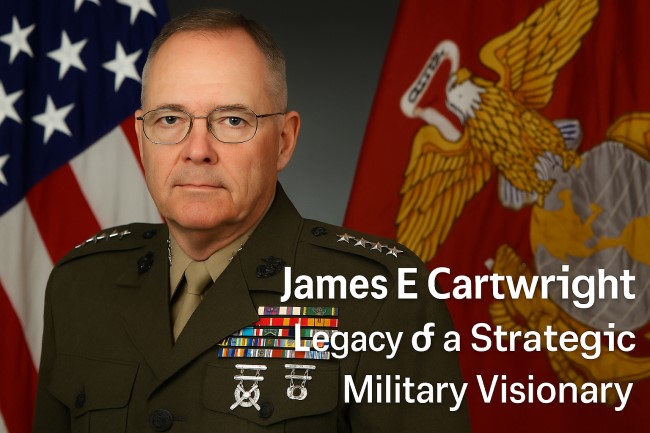James E Cartwright: Legacy of a Strategic Military Visionary

James E Cartwright is a name etched in the annals of U.S. military history. Known for his sharp strategic intellect and pivotal roles in shaping America’s defense posture, Cartwright served with distinction for over four decades in the United States Marine Corps. As a four-star general, he held some of the most influential positions in the U.S. military, including Vice Chairman of the Joint Chiefs of Staff and Commander of U.S. Strategic Command.
This article explores the life, career, and impact of General James E Cartwright, also recognized by his military call sign, Gen James E “Hoss” Cartwright.
Early Life and Education
James Edward Cartwright was born on September 22, 1949, in Rockford, Illinois. From an early age, Cartwright showed qualities of leadership and discipline. He later attended the University of Iowa, where he earned his undergraduate degree before embarking on a lifelong career in military service.
His pursuit of excellence led him to attend the Naval War College, where he obtained a Master’s degree, and later became a distinguished graduate of the Air Command and Staff College. His academic credentials were further bolstered by his participation in the MIT Seminar XXI, an elite fellowship for military and political leaders.
Marine Corps Career Beginnings
Naval Flight Officer and Aviator
James E Cartwright joined the United States Marine Corps in 1971 and quickly rose through the ranks. In 1973, he was designated a Naval Flight Officer, and by 1977, he earned his wings as a Naval Aviator. His aviation career included piloting aircraft such as the F-4 Phantom, OA-4 Skyhawk, and F/A-18 Hornet.
Leadership Roles
Cartwright’s leadership potential became evident through various command positions. He led units such as:
-
Marine Fighter Attack Squadron 232 (VMFA-232)
-
Marine Aircraft Group 31
-
1st Marine Aircraft Wing
These roles not only showcased his tactical capabilities but also demonstrated his ability to lead and modernize combat-ready forces.
U.S. Strategic Command and Nuclear Deterrence
Commander of U.S. Strategic Command (USSTRATCOM)
In 2004, Cartwright assumed command of the U.S. Strategic Command, one of the most critical combatant commands in the Department of Defense. Under his leadership, STRATCOM oversaw the nation’s nuclear arsenal, global strike capabilities, space operations, and cybersecurity.
Cartwright was instrumental in reshaping STRATCOM’s mission for the 21st century, moving beyond Cold War doctrines and integrating cyber warfare and space-based defense into strategic planning.
Visionary Military Thinker
Known for his analytical mindset, Gen James E Hoss Cartwright played a significant role in promoting innovation in military strategy. His influence expanded into missile defense, nuclear arms reduction, and the use of non-kinetic tools such as cyber weapons.
Vice Chairman of the Joint Chiefs of Staff
In 2007, Cartwright became the 8th Vice Chairman of the Joint Chiefs of Staff, serving until 2011. This position made him the second-highest-ranking officer in the United States Armed Forces, reporting directly to the President and Secretary of Defense.
As Vice Chairman, he helped shape defense budgets, weapons procurement, and national security policy. He was a strong advocate for developing next-generation military technologies and ensuring the U.S. remained strategically superior.
His time in office coincided with critical events including:
-
Counterterrorism operations in the Middle East
-
Cybersecurity threats to national infrastructure
-
Global discussions on nuclear disarmament and modernization
Awards and Decorations
General James E Cartwright received numerous military honors throughout his career, including:
-
Defense Distinguished Service Medal
-
Navy Distinguished Service Medal
-
Army, Air Force, and Coast Guard Distinguished Service Medals
-
Legion of Merit
-
Several campaign medals and unit citations
These awards reflect a career defined by leadership, innovation, and unwavering commitment to national defense.
Controversy and Presidential Pardon
In the years following his retirement, Cartwright became involved in a legal investigation related to the leak of classified information concerning the Stuxnet cyberattack on Iran’s nuclear program. In 2016, he pleaded guilty to making false statements to federal investigators during the probe.
Despite the controversy, Cartwright remained respected in defense circles. Recognizing his decades of service and contributions to national security, President Barack Obama granted him a full pardon in January 2017.
Post-Military Career and Thought Leadership
Defense Policy and Advisory Roles
After retiring from active duty, Cartwright continued to influence defense strategy and technology policy. He served as the Harold Brown Chair in Defense Policy Studies at the Center for Strategic and International Studies (CSIS) and participated in global security forums, including the Aspen Strategy Group.
Corporate and Strategic Advisory Work
Cartwright also lent his expertise to private sector defense and aerospace companies, including:
-
Raytheon
-
SpaceX
-
IP3 Security
-
Beyond Aerospace
His advice focused on areas such as artificial intelligence, nuclear strategy, cybersecurity, and military-industrial innovation.
Legacy and Influence
James E Cartwright is widely considered one of the most influential military minds of the modern era. His legacy spans across:
-
The evolution of nuclear and cyber deterrence
-
The modernization of military doctrine
-
The integration of technology into strategic defense planning
His leadership and foresight have helped position the U.S. military for the emerging challenges of the 21st century.
Conclusion
In the realm of defense and strategic military operations, General James E Cartwright stands as a figure of immense importance. From flying fighter jets to managing nuclear deterrence and influencing cyber warfare policies, his career reflects an enduring dedication to national security and innovation.
Despite facing legal challenges later in life, his overall contributions remain significant. Gen James E Hoss Cartwright will be remembered not only as a skilled Marine Corps aviator and top-ranking general but also as a visionary who helped redefine the future of warfare in the digital age.



